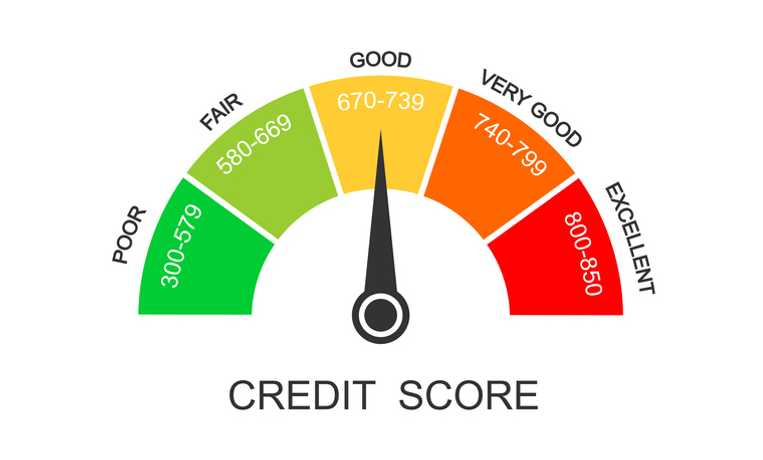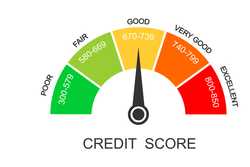What Are the Different Credit Scoring Ranges?

Our evaluations and opinions are not influenced by our advertising relationships, but we may earn a commission from our partners’ links. This content is created by TIME Stamped, under TIME’s direction and produced in accordance with TIME’s editorial guidelines and overseen by TIME’s editorial staff. Learn more about it.
Knowing your credit score is important if you plan on applying for a loan or credit card. But seeing a number and understanding what it means are two different things. That’s why lenders look at scores by range, making it easier for them to determine whether or not to lend money to an applicant.
There are four broad categories that a credit score can fall into: Bad, fair, good, and excellent. However, the two scoring models, FICO and VantageScore, have slightly different names for these categories. Both have five ranges: FICO’s are poor, fair, good, very good, and exceptional and VantageScore’s are very poor, poor, fair, good, and excellent.
The following table shows a breakdown of where FICO and VantageScores fall within the four broad ranges.
| Category | FICO Score Range | VantageScore Range |
|---|---|---|
Bad | 300-579 | 300-600 |
Fair | 580-669 | 601-660 |
Good | 670-799 | 661-780 |
Excellent | 800-850 | 781-850 |
A credit score that’s under 580 to 600 is considered “bad.” If you have a score in this range, you’ll likely struggle to find lenders who are willing to approve you for a loan or credit card. This can be very limiting and mean you’re unable to get a loan to buy a house or a car, or open a credit card for emergencies, unless you can improve your score.
FICO Score: 300-579
VantageScore: 300-600
A “fair” credit score is considered to be between 580 and 669, depending on the type of score the lender uses. If you have a fair credit score, you’re more likely to be approved for loans and credit cards—though not all lenders will approve loans for borrowers with a fair credit score. And you can expect to be offered loans with higher interest rates than you would if your credit score were in the “good” range.
FICO Score: 580-669
VantageScore: 601-660
If your credit score falls around the 670 to 799 range, it’s usually considered “good.” With a credit score in this range, you’re likely to be approved for most loans or credit cards. A good credit score shows that you are responsible with your finances and less likely to default on a loan, which can translate to a lower interest rate.
FICO Score: 670-799
VantageScore: 661-780
Finally, a credit score between 781 and 850 falls is considered “excellent.” A credit score in this range shows lenders that you would be an excellent borrower and would repay your loan or line of credit as promised. This can lead to additional perks such as 0% introductory APRs on credit cards or 0% financing for cars.
FICO Score: 800-850
VantageScore: 781-850
In most cases, the credit score you’ll need in order to qualify for different financial products will depend on the lender and the product. Below are some typical minimum credit scores for different products, though these numbers will not represent every lender’s requirements. It’s a good idea to check before submitting an application.
| Financial Product | Minimum Credit Score |
|---|---|
Conventional mortgage loan | 620 |
Jumbo mortgage loan | 700 |
500 | |
VA mortgage loan | 620 |
USDA mortgage loan | 580 |
Car loan | 350 |
Personal loan | 670 |
Student loan | 600 |
Unsecured credit card | No credit check required |
Secured credit card | Varies by card |
Apartment rental | 650 |
Mortgage lenders can vary somewhat in their requirements, but in general you can expect to be approved for a conventional loan with a credit score of 620 or higher. If you’re buying a luxurious home or moving to a high-cost area you may need to apply for a jumbo loan, which can require a higher score of 700 and up. However, there are options available even if you have a lower score—mortgage loans backed by the Federal Housing Administration (FHA) are often approved for borrowers with credit scores as low as 500.
It’s wise to check your scores before you start your homebuying search—and work to raise them if they’re not high enough. Experian offers both a free CreditWorks service and a Premium version that can help you track your progress daily and monitor your scores at all three credit bureaus. And signing up for Experian Boost will help you raise your scores by getting credit for paying bills, such as those for utilities, rent, and your cellphone.
If you’re buying a car, you can probably get a loan even if your credit is in the “bad” range. However, that loan may likely come with an extremely high interest rate. Borrowers with “good” or “excellent” credit scores will get better terms and rates on car loans. It’s wise to work on improving your credit score before applying for an auto loan if possible. The same is true for personal loans and private student loans. Note that lenders may be stricter when it comes to approving these as they are unsecured—while a lender can repossess a car from a borrower who fails to repay a car loan, there is no such recourse for an unsecured loan. (Most federal student loans, however, don’t require credit checks.)
When it comes to credit cards, you’ll likely want to apply for a secured credit card if you have bad credit. Lenders usually don’t run credit checks for secured credit card applicants since the borrower is required to put down a cash deposit to act as collateral. Traditional, or unsecured, credit card companies have stricter requirements and may only approve applicants with a “good” or “excellent” credit score—though this will vary based on the lender and the type of card. There are some unsecured credit cards for people with less than good credit.
Finally, a credit score of 650 and up is likely to make renting an apartment easier. While landlords often run a credit check before renting to a tenant, there may be no minimum credit score requirement.
Credit scoring ranges differ slightly between FICO and VantageScore, but both follow a similar structure with categories ranging from “bad” to “excellent.” Lenders have different requirements within these ranges but in general, you can expect to be approved for loans and credit cards fairly easily with a credit score of 670 and up.
Although some lenders may be willing to approve a car loan to an applicant with no credit history, it will likely be extremely hard to find one that will. And if you can find one, chances are the loan will come with an extremely high interest rate requiring high payments. If you can get a family member or friend with good or excellent credit to be a co-signer, you may have a better chance of finding a car loan without an extortionate interest rate.
That depends on the lender and the type of loan for which you’re applying. In general, lenders will look for a score of 620 or higher when you apply for a conventional loan or a VA loan. For FHA loan applicants, a score of 500 or higher is likely acceptable, while USDA loan applicants may need a score of 580 or higher.
The answer to this question will depend on the credit card issuer’s requirements. In general, though, you’ll need a “good” or “excellent” credit score to be approved for a premium travel credit card. That means a score of 670 or higher for lenders that use FICO Scores and 661 or higher for those that use VantageScore. If you’re trying to apply for a better card, MyFICO’s FICO Basic, Advanced, and Premium service offerings provide alerts as your credit score changes so you can see the effects of your efforts and when they’ve succeeded. They also protect against identity theft.
The information presented here is created by TIME Stamped and overseen by TIME editorial staff. To learn more, see our About Us page.




